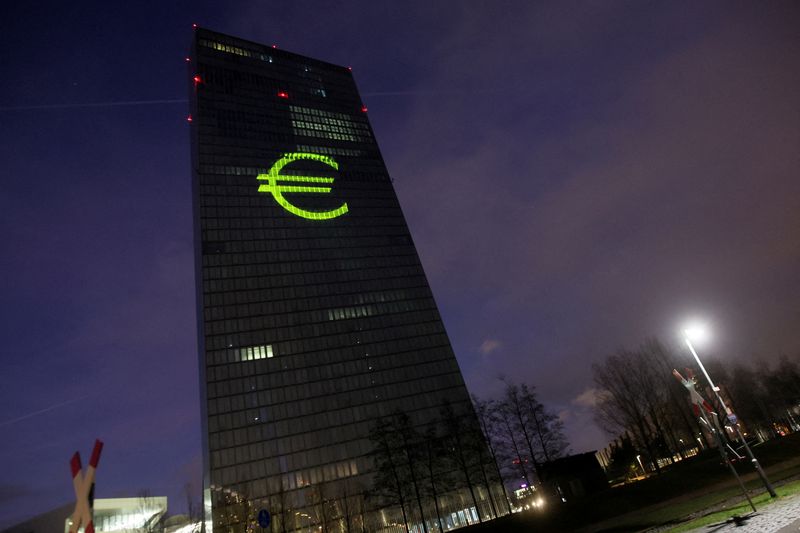Fubotv earnings beat by $0.10, revenue topped estimates
Investing.com - The European Central Bank slashed interest rates yet again on Thursday as anticipated, while officials also lowered their growth forecast for 2025 due in large part to uncertainty around global trade tensions.
The sixth ECB rate reduction since June, which had been broadly expected by markets, brought down its key deposit rate by 25 basis points to 2.50% from 2.75%.
In a statement, the central bank said monetary policy is becoming "less restrictive," as rate cuts are easing borrowing costs for businesses and households and encouraging loaning.
But officials flagged that the Eurozone still faces "continued challenges," leading staff to mark down their growth projections for 2025 to 0.9% from a prior estimate of 1.1%. Expectations for next year were also decreased to 1.2%, down from 1.4%.
"The downward revisions for 2025 and 2026 reflect lower exports and ongoing weakness in investment, in part originating from high trade policy uncertainty as well as broader policy uncertainty," the ECB said.
Along with relatively tepid activity and cooling inflationary pressures, several recent developments have clouded the ECB’s outlook for interest rates.
Potential reciprocal U.S. tariffs on European Union goods loom large, with President Donald Trump having hit out at the EU for what he has called unfair trade practices. Brussels has vowed to respond to any U.S. levies.
Meanwhile, coalition negotiations in the region’s traditional economic powerhouse, Germany, are ongoing.
Amidst all of this, recent actions and statements from the Trump administration regarding a possible ceasefire in the war in Ukraine have threatened to upend Europe’s defense strategy, especially its longstanding reliance on Washington to provide a security backstop.
Analysts have begun to ponder if European leaders may need to increase defense spending, potentially shaking up the priorities of several government budgets.
European Union leaders are holding emergency talks in Brussels on Thursday about beefing up security in the 27-member bloc and ensuring that Ukraine will remain properly protected from future possible Russian threats.
Earlier this week, German parties currently in talks to form a coalition government agreed on a deal to loosen the country’s strict borrowing limits.
The move to ease Germany’s so-called debt brake -- a key sticking point that partly led to the collapse of current Chancellor Olaf Scholz’s government late last year -- also came with a deal to create a new 500 billion-euro fund aimed at bolstering infrastructure and defense spending.
Friedrich Merz, the leader of Germany’s Christian Democratic Union and likely Scholz’s successor, is set to present a joint bill in parliament next week.
Merz said the agreement between the CDU, its Bavarian sister party and Scholz’s Social Democrats was in response to recently growing fears over Europe’s defense capabilities and signs of sluggishness in the German economy.
The prospect of increased defense spending -- and the U-turn from Germany’s longstanding frugal approach to fiscal policy -- has exacerbated investor worries over inflation. German bond yields have sold off sharply, weighing on global stocks.
Still, data on Monday showed that consumer prices in the 20 nations sharing the euro eased to 2.4% in February from 2.5% in the prior month, inching down closer to the ECB’s stated 2% target level.
The ECB reiterated that the process of disinflation in the Eurozone is "well on track," but raised its headline inflation prediction for this year to 2.3% from 2.1%, citing stronger energy prices. Excluding energy and food costs, inflation in 2025 is seen at 2.2%.
It added that "in current conditions of rising uncertainty," officials will continue to follow a "data-dependent" approach to monetary policy decisions and are "not pre-committing to a particular rate path."
"The ECB finds itself in a challenging position between the threat of U.S. tariffs in the near-term that could warrant further policy rate cuts — and a move into stimulative territory – and the growing commitment to higher defense spending over the next several years which will be required to secure Europe’s strategic autonomy," said Mark Wall, Chief European Economist at Deutsche Bank (ETR:DBKGn).
"This environment requires a deft hand on the monetary policy lever and the preservation of policy optionality.”
